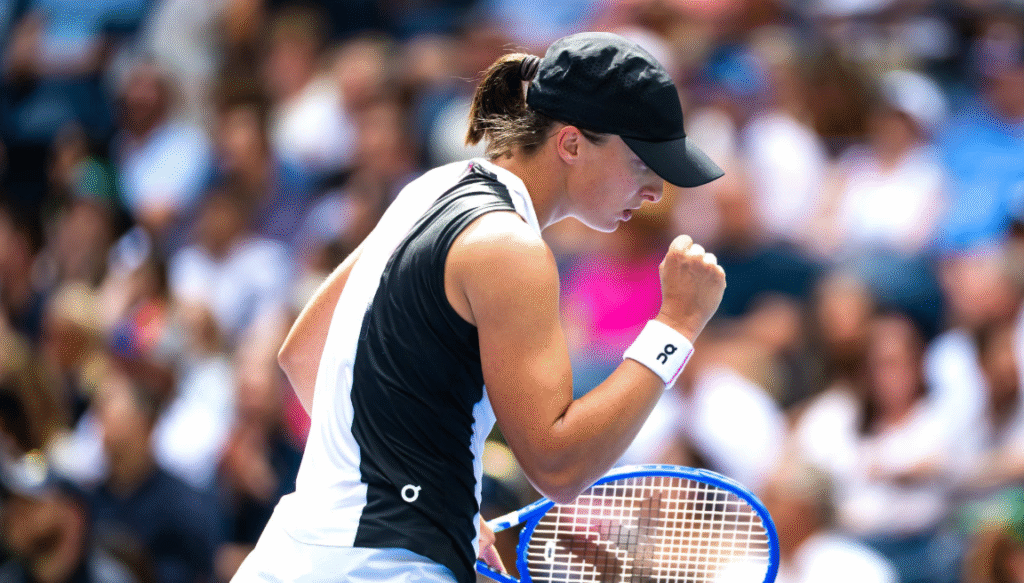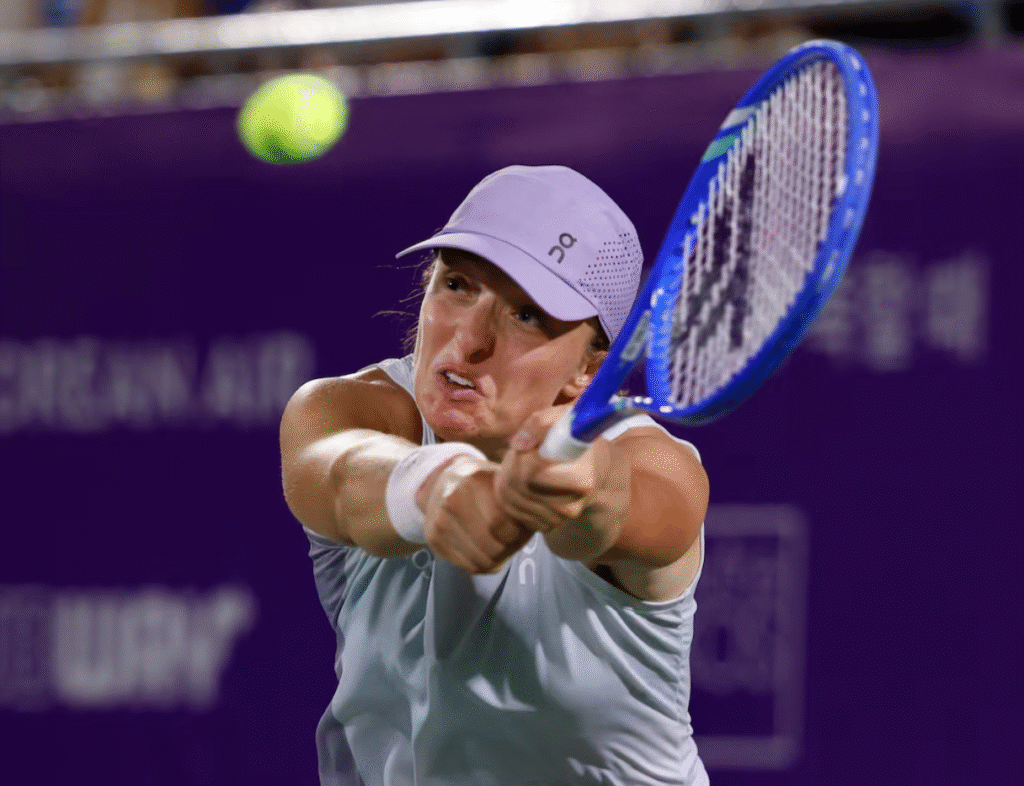
In the world of tennis, statistics often tell the story: winners, unforced errors, breakpoints converted, and percentages that spell out dominance or weakness. But every so often, a match transcends the numbers and becomes a battle of heart, resilience, and the intangible qualities that separate the great from the merely good. Such was the case at the 2025 Korea Open final in Seoul, where Iga Swiatek, the Polish star and four-time Grand Slam champion, fought her way past Ekaterina Alexandrova to secure her 25th career WTA title.
The scoreline read 1-6, 7-6(3), 7-5, but the drama was far richer than those digits suggest. Across nearly three hours of relentless tennis, Swiatek showed why her presence at the top of the sport feels inevitable: even when she isn’t playing her best, she finds a way to win.
A Rough Start: Alexandrova Strikes First
The opening set looked nothing like a championship performance from Swiatek. Alexandrova came out swinging, playing with freedom and aggression that immediately rattled the world No. 3. Swiatek struggled to find rhythm on her serve, sprayed uncharacteristic errors, and offered up short balls that Alexandrova dispatched with ease.
It took just 28 minutes for Alexandrova to wrap up the first set 6-1, and the crowd in Seoul sensed an upset brewing. This wasn’t the composed, assured Swiatek who had lifted Wimbledon earlier this year or who had powered through the Cincinnati draw. Instead, it was a player scrambling for answers, fighting herself as much as her opponent.
The Turning Point: Tiebreak Heroics
The second set, however, told a different story. Though Alexandrova continued to pressure Swiatek with her flat, penetrating groundstrokes, the Pole began to steady herself. She started to extend rallies, move her opponent from side to side, and impose the kind of relentless consistency that has become her trademark.
Twice, Alexandrova was within touching distance of victory, serving at 5-4 and 6-5. Each time, Swiatek stared down the pressure and found a way to hold. Her serve remained shaky—double faults crept in at inopportune moments—but her resilience in long rallies gave her just enough breathing space.
The set culminated in a tiebreak where Swiatek’s experience shone. While Alexandrova blinked with a few mistimed errors, Swiatek seized the moment, racing to a 7-3 win in the breaker. The match was back on even terms, and the Seoul crowd roared in approval.
A Decider Filled with Drama
If the second set was tense, the third was pure theater. Breaks of serve flew back and forth, with neither player able to sustain momentum. Swiatek’s forehand—so often her weapon—misfired at times, but her competitive fire never waned. Alexandrova, meanwhile, pushed hard, sensing her chance at a career-defining title.
At 5-5 in the decider, the tension reached its peak. Swiatek, refusing to wilt, produced a series of gutsy winners and finally secured the crucial break. Serving for the championship, she faced the familiar nerves that had haunted her earlier in the match, but on match point, she found a cross-court forehand that clipped the line. Victory was hers.
Milestone 25: A Legacy in Motion
This wasn’t just another title for Swiatek—it was her 25th career WTA singles trophy, making her the first player born in the 2000s (male or female) to achieve that mark. For perspective, many greats of the game didn’t reach that milestone until later in their careers. At just 24 years old, Swiatek has already positioned herself among the elite.
Her journey to 25 has been a mix of dominance and evolution. From her breakout win at the 2020 French Open to her current status as a multi-surface champion, Swiatek has proven she isn’t confined to clay. Wimbledon this summer was the ultimate testament, but her victory in Seoul—on hard courts, after being pushed to the brink—showed her adaptability and mental strength.
Outplayed on Paper, Victorious on Court
Perhaps the most remarkable aspect of this win is that Swiatek was statistically outperformed in several key areas. Alexandrova hit more winners, served more aces, and often dictated the pace of rallies. Yet Swiatek emerged with the trophy.

How? The answer lies in her ability to win the “big points.” When the margins were thin, when the rallies stretched past 10 shots, and when nerves threatened to undo her, Swiatek found solutions. Tennis matches aren’t won by piling up numbers—they’re won by capturing the moments that matter most.
This ability to rise when it counts is why Swiatek has become such a feared competitor. Even on her off days, opponents know they must do more than just play well; they must sustain brilliance long enough to cross the finish line. Few manage it.
Ranking Implications and the No. 1 Race
Beyond the milestone, Seoul also carries ranking implications. Swiatek has been chasing Aryna Sabalenka in the battle for year-end world No. 1. With Sabalenka defending heavy points in the Asian swing and the WTA Finals, Swiatek’s Seoul title could prove critical.
By adding a 500-level trophy to her season haul (which already includes Wimbledon and Cincinnati), Swiatek narrows the gap and builds momentum heading into Beijing, Wuhan, and Riyadh. The race remains tight, but every point matters. And victories like this—gritty, earned under pressure—signal that Swiatek isn’t content to settle for second.
The Bigger Picture: Growth Beyond Titles
Swiatek’s career has often been defined by dominance, but the Seoul final showcased something deeper: her growth as a competitor. She has learned not only to win when she’s playing well but also to survive when she isn’t. That quality—mental fortitude under adversity—is what transforms great talents into legends.
She acknowledged as much in her post-match comments, noting how difficult the match was and how proud she was to “find a way.” For a player who once admitted to struggling with the pressure of expectations, this kind of resilience marks real evolution.
What’s Next?
Swiatek now turns her attention to the bigger tournaments ahead: the China Open in Beijing, the Wuhan Open, and ultimately the WTA Finals in Riyadh. Each presents opportunities to add to her tally and, more importantly, to strengthen her bid for the No. 1 ranking.
For Alexandrova, the Seoul final will sting, but it also represents progress. She proved she can go toe-to-toe with one of the game’s best and nearly topple her. That kind of performance can serve as a springboard for future success.
Conclusion: A Champion’s Grit
The 2025 Korea Open final wasn’t the prettiest match of Iga Swiatek’s career. It was messy, fraught with errors, and filled with moments where defeat seemed imminent. But in many ways, that’s what makes it special.
By grinding out a win when outplayed, Swiatek showed a different side of her greatness. She isn’t just a front-runner who dominates when her game flows; she’s a fighter who can claw her way back from the brink. That quality is what defines champions.
With her 25th title secured, Swiatek’s legacy continues to grow. She has become not only the face of her generation but also a player whose name is already etched among the sport’s greats. And if Seoul is any indication, her best chapters may still lie ahead.